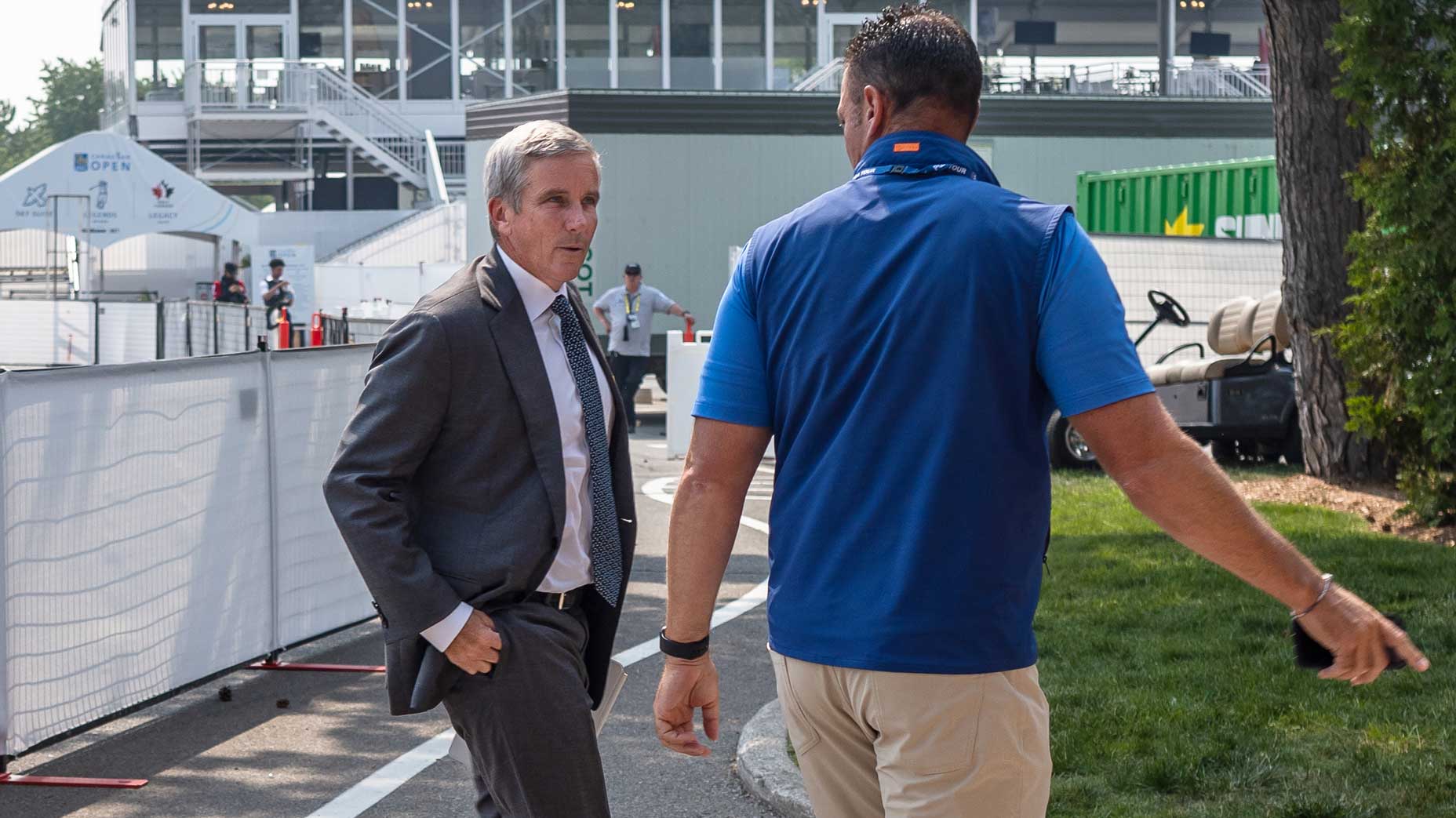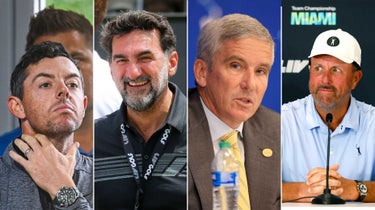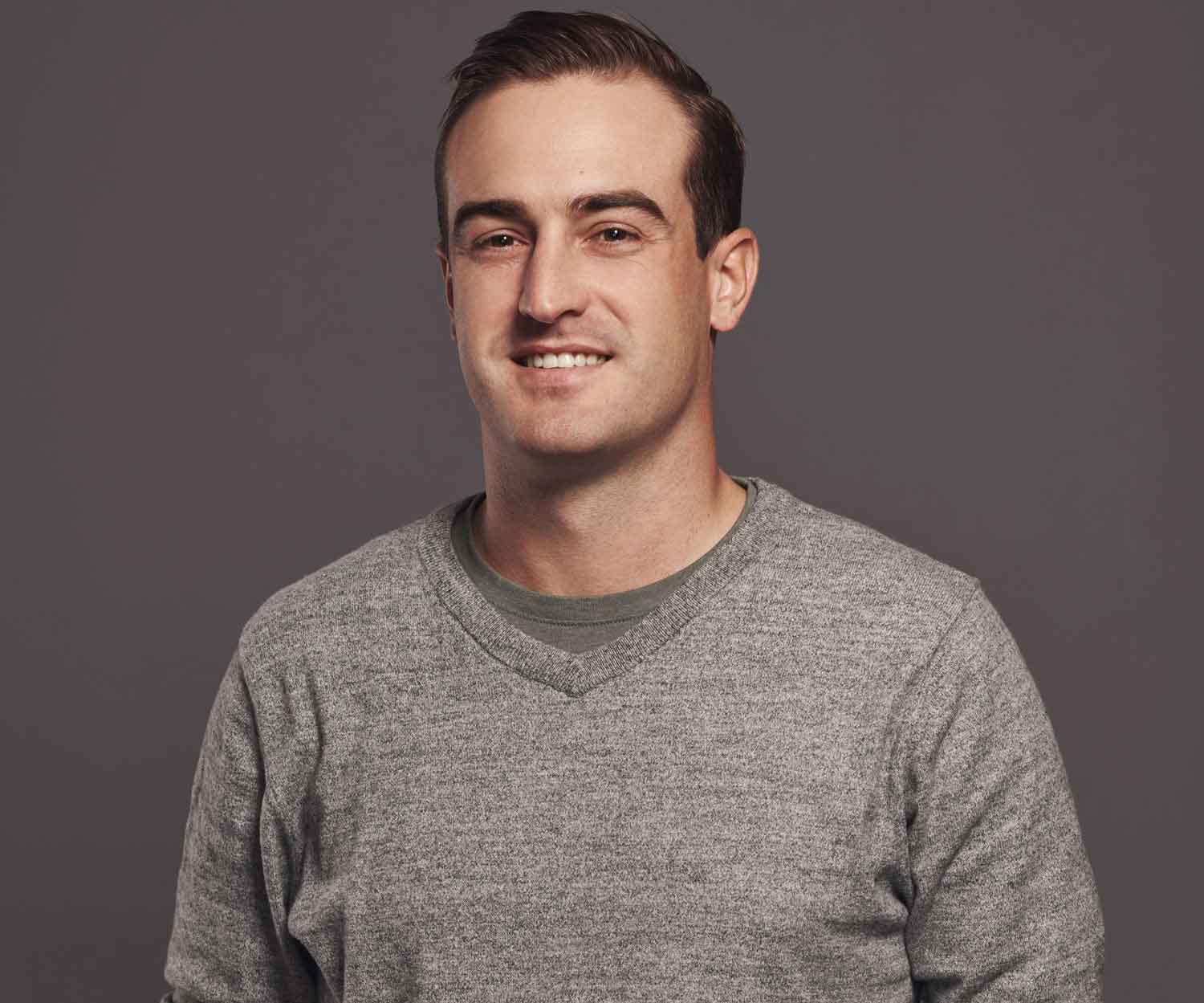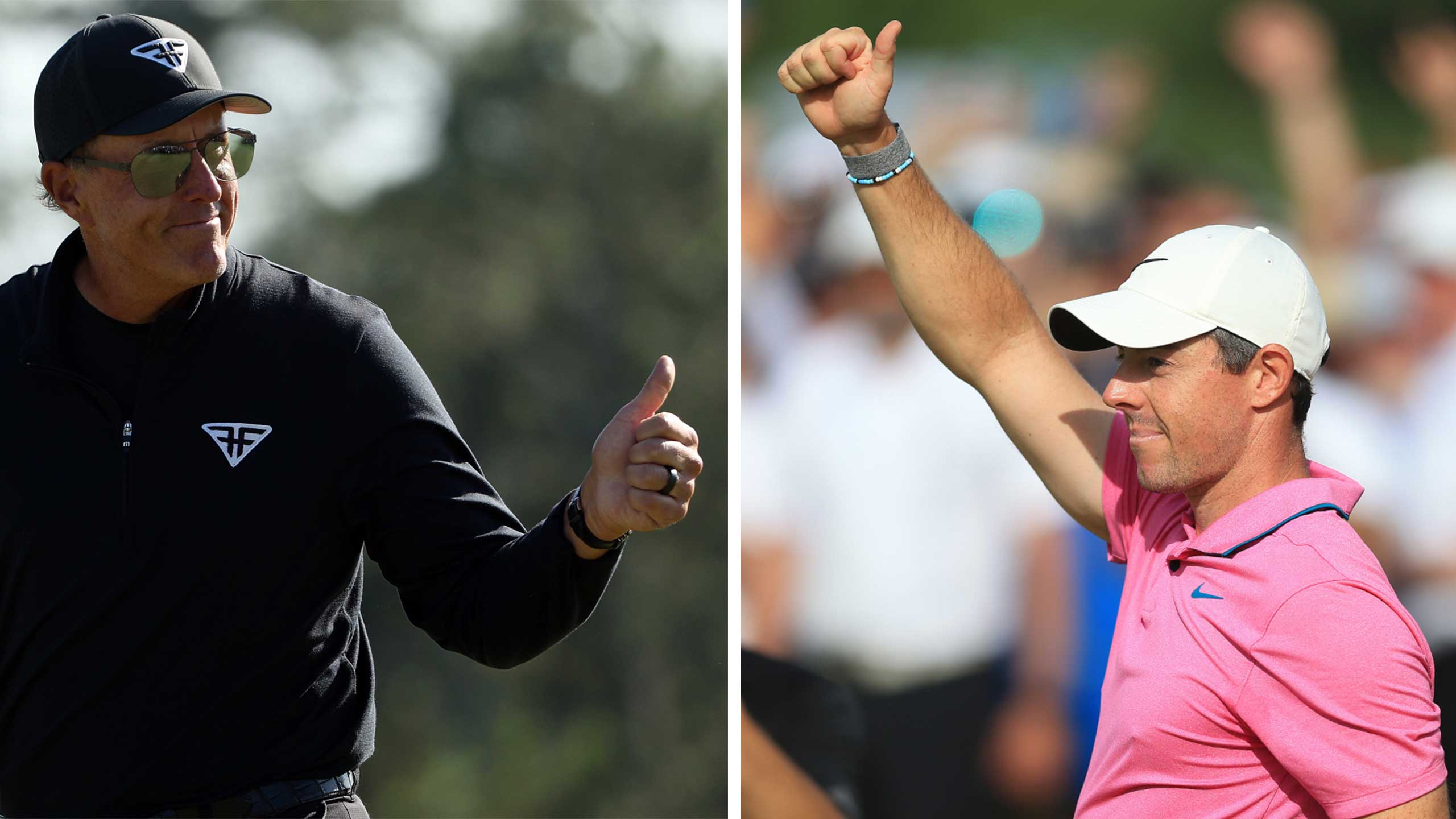
Jay Monahan arrived at the Canadian Open Tuesday afternoon.
Getty Images
Around 5:30 Tuesday evening, PGA Tour commissioner Jay Monahan found himself in front of dozens of media members in a virtual press conference. Why was it virtual? Because no one saw it coming. At least no one but Monahan himself. It was the second leg of an explaining tour.
For much of the previous 90 minutes, Monahan had been in a meeting with PGA Tour players, answering their questions for the first time since he ushered in a seismic shift to the pro golf landscape. The PGA Tour (and the DP World Tour) was merging with LIV Golf in a principal agreement between Monahan, Yasir Al-Rumayyan, the governor of the Saudi Arabian Public Investment Fund, and two PGA Tour board directors. After more than a year of telling PGA Tour players to not join LIV Golf and sign contracts for tens (and even hundreds) of millions of dollars from Saudi Arabia, Monahan was explaining why he was now accepting Saudi investment on behalf of all of them.
“It’s spicy in here,” one Tour member texted, mid-meeting. Other reports quickly confirmed that the meeting, which was expected to last one hour, was spilling over its time slot. When it was done, surely Monahan took a deep breath. Or multiple deep breaths. Because up next were a dozen questions from media members, his answers to which would be much more public than those he shared with the Tour membership. Here’s a summary of what the PGA Tour commissioner shared Tuesday evening.
A very small group of people brokered this deal.
The very first question Monahan received pertained to the speed at which a merger progressed. Monahan admitted that there were four in-person meetings and a number of video and phone calls that took place over the last seven weeks. Essentially, that means all meetings took place since Jon Rahm’s Masters victory.
The parties involved were limited: The PIF, Monahan, and then two independent directors that serve as members of the PGA Tour’s Policy Board: Ed Herlihy and Jimmy Dunne. “The direct answer to your question is when you get into these conversations, and given the complexity of what we were dealing with, it’s not uncommon that the circle of information is very tight,” Monahan said.
Zero players were briefed on the matter before Tuesday.
The entire deal between the PGA Tour and the PIF, LIV Golf and the DP World Tour is what Monahan called a “framework agreement.” The binding nature of it, at the moment, is that all litigation between the parties has been dropped. That includes the original suit between LIV Golf and the PGA Tour. It includes the tortious interference counter-claim that the Tour had issued back at LIV. All of it has been dropped, essentially making Tuesday’s announcement a settlement of court dealings.
The reason why Monahan did not bring in players such as Rory McIlroy or even Tiger Woods to the table is because he believed he needed a baseline agreement to be established — and confidentiality agreed to among a small group — and litigation to be dropped before he could proceed by bringing in significant voices to hammer out additional details.
“Obviously Tiger and Rory’s perspective is one that I understand very well, and it was part of my thinking throughout these conversations,” Monahan said, “and it will be a part of my thinking going forward. Now that we’re in a framework agreement, I look forward to talking to all of our players, including the two of them, to make certain that this comes off the right way.”
As a result, players were extremely upset.
The overarching theme of the day was that PGA Tour players were kept entirely in the dark. “I’m completely blindsided,” another top pro texted. Monahan did issue a letter to players Tuesday morning before appearing on CNBC, but as Collin Morikawa was quick to point out, a number of players found out in a less intimate way: via Twitter.
Monahan met with many pros Tuesday before his press conference, so naturally he was asked about the feeling in the room. “I would describe the meeting as intense,” he said. “Certainly heated.” Monahan was asked by the press how he handled the act of explaining the news to PGA Tour members, especially when many of them passed up many millions of dollars in LIV contracts.
“You know, it probably didn’t seem this way to them, but as I looked to our players,” Monahan said, “those players that have been loyal to the PGA Tour, I’m confident that the move that they made — they’ve made the right decision. They’ve helped rearchitect the future of the PGA Tour. They’ve moved us to a more pro-competitive model.”
He seems to know how it’s all looks.
Monahan made perhaps the most significant 180-degree turn we’ve seen in modern golf history. He spent months battling LIV Golf and the idea of Saudi investment. And then, over the last two months, something changed. And to no surprise, that turn has earned him plenty of ire on social media, in addition to what he earned from the Tour membership up in Canada. He’s ready for all of that, based on how he seemed Tuesday evening.
“Going back to the origin of LIV, I said this, they needed to go down their path and we were going to go down ours,” Monahan said. “We’ve done everything we can within our control to improve and grow the PGA Tour, and they have launched LIV; they’ve proceeded with LIV; they’ve made progress with LIV. But ultimately it was looking at the broader picture and saying that I don’t think it’s right or sustainable to have this tension in our sport, and to be able to organize and orient this in a way where, again, we’re in a control position, we have an investor, a great and world-class investor, and I recognize everything that I’ve said in the past and in my prior positions.
“I recognize that people are going to call me a hypocrite. Anytime I said anything, I said it with the information that I had at that moment, and I said it based on someone that’s trying to compete for the PGA Tour and our players. I accept those criticisms. But circumstances do change. I think that in looking at the big picture and looking at it this way, that’s what got us to this point.”
LIV Golf (and team golf!) will be thoroughly evaluated.
Pro golf’s civil war, as we knew it, is over. Now, LIV Golf is a PGA Tour partner. Monahan addressed it as such Tuesday evening. It was particularly attractive, he said, to “take a competitor off the board, to have them exist as a partner, not an owner.” But what does that mean for LIV itself?
Monahan mentioned the need for an “empirical evaluation” of LIV Golf. “I don’t want to make any statements or make any predictions,” Monahan said. “But what is in place is a commitment to make a good-faith effort to look at team golf and the role it can play going forward.”
As we understood earlier in the day, the 2023 PGA Tour and LIV Golf schedules will play out as expected. That includes weeks wherein both tours host competing events. Monahan was asked about the potential for that moving forward, like in 2024.
“I can’t see that scenario, but I haven’t gotten into the full evaluation, full empirical evaluation of LIV that I’m going to do to be able to comment on that. But I don’t see that scenario, no.
“To me, any scenarios that you’re thinking about that bridge between the PGA Tour and LIV would be longer term in nature.”
This was just the start of many conversations.
As mentioned, Monahan met with players at 4 p.m. He then met with the press around 5:30 p.m. Up next was a meeting with the PGA Tour Advisory Council, a group of 16 players that represent the membership. The details for the merger were finalized Monday night, and Monahan noted the framework of a communication plan that starts Wednesday morning.









